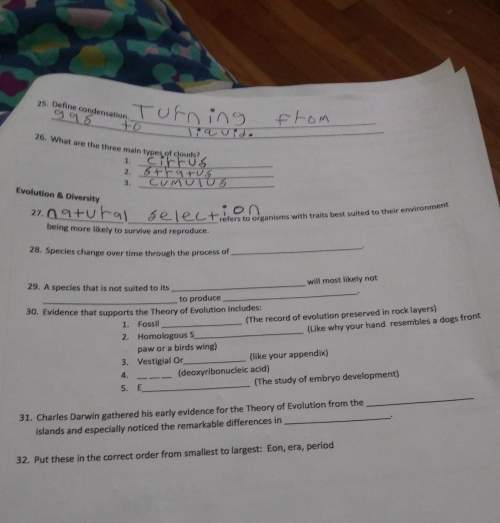
Physics, 14.10.2019 23:20 tylorroundy
Number the statements listed below in the order that they would occur in engine operation. then, label these stages as intake, compression, power, or exhaust. a. the fuel mixture is ignited by the spark plug, and the resulting explosion forces the piston down in the cylinder. b. the piston rises and compresses the fuel mixture in the combustion chamber. c. the exhaust gases left over from the combustion are released from the cylinder. d. a mixture of air and fuel is drawn into the cylinder.

Answers: 3


Another question on Physics

Physics, 22.06.2019 00:30
Comedians like to joke that the reason we haven’t been visited by intelligent life from elsewhere in the universe is that aliens have been monitoring earth’s broadcasts of intellectually embarrassing tv programs, like gilligan’s island, fear factor, the jersey shore, and the jerry springer showand so consider us far too primitive to merit a visit. let’s check the assertion that aliens could have been receiving them. tv programs are broadcast at a frequency of about 100mhz with about 100kw of total power in 30frames per second, which emanatesroughly uniformly in all directions. assume that interstellar space transmits these broadcasts without attenuation. no matter how smart they are, aliens would require at least one photon per frame to interpret our signals. findthe number of photons per unit time per unit area reaching a receiver on a possible planet in the nearest star system, which is about 4 light-years away (a light-year is the distance light travels in a year). if aliens aimed a receiver or detector directly at earth, how big (in diameter) would it have to be to receive a photon per frame
Answers: 2

Physics, 22.06.2019 07:20
If 2 moles of co_2 at 2l and 500k are expanded reversibly to 20l, more work can be obtained from an adiabatic process than from an isothermal process. is the above statement true or false?
Answers: 3

Physics, 22.06.2019 14:00
Why is rain likely when warm, moisture-laden air meets cold air? a) the lighter warm air will rise and cool down, causing condensation and rain. b) the cold air moves faster and pushes the warm air away, causing condensation and rain. c) the moisture in the warm air condenses on contact with the cold air, causing rain to fall. d) the cold air mixes with the warm air, reducing its temperature causing moisture to condense.
Answers: 1

Physics, 22.06.2019 22:00
Notice how they put future which of the clouds shown would indicate a possible future rain storm? a) b) c) d)
Answers: 1
You know the right answer?
Number the statements listed below in the order that they would occur in engine operation. then, lab...
Questions

Mathematics, 09.03.2021 07:20

English, 09.03.2021 07:20


Mathematics, 09.03.2021 07:20


Mathematics, 09.03.2021 07:20


Mathematics, 09.03.2021 07:20


Mathematics, 09.03.2021 07:20



Mathematics, 09.03.2021 07:20


Chemistry, 09.03.2021 07:20









